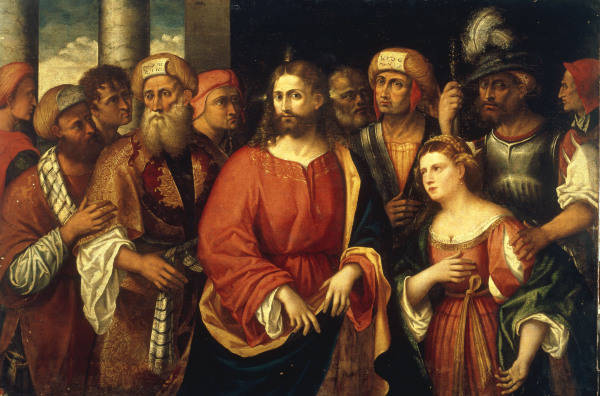The shameful woman
The Adulteress.
(The Gospel History, Section 78)
And they went every man unto his own house: but Jesus went unto the mount of Olives. And early in the morning he came again into the temple, and all the people came unto him; and he sat down, and taught them. And the scribes and the Pharisees bring a woman taken in adultery; and having set her in the midst, they say unto him, Master, this woman hath been taken in adultery, in the very act. Now in the law Moses commanded us to stone such: what then sayest thou of her? And this they said, tempting him, that they might have whereof to accuse him. But Jesus stooped down, and with his finger wrote on the ground. But when they continued asking him, he lifted up himself, and said unto them, He that is without sin among you, let him first cast a stone at her. And again he stooped down, and with his finger wrote on the ground. And they, when they heard it, went out one by one, beginning from the eldest, even unto the last: and Jesus was left alone, and the woman, where she was, in the midst. And Jesus lifted up himself, and said unto her, Woman, where are they? did no man condemn thee? And she said, No man, Lord. And Jesus said, Neither do I condemn thee: go thy way; from henceforth sin no more.
The shameful woman
(The Saviour of the World, Vol V Book III Poem XXXIV)

Christ sought the Mount of Olives, there to pray;
While every man went on his homeward way
At the fall of night; the early morning found
The Lord again in the temple, and around,
Multitudes who had early come to hear;
He sat and taught the people.
To them, draw near
A group of the enemy, scribes and Pharisees,
Dragging a shameful woman. When she sees
The Lord, does her vileness stab her dagger-wise,
That wretched creature—centre of all eyes?
All eyes but His—The Lord averts His face—
Sure, punishment enough for one so base!
They clamour,—“Moses bade stone such an one,
But what say’st Thou,—see’st any way to atone?”
Now, they had caught Him in a trap, egress
At either end of which should Him confess
Traitor to th’ Law, or, in complicity
With one whose odious vice might find no plea:
But Jesus, stooping down, wrote on the ground,
With His finger curious characters performed:
They will not take His silence for reply;
Reproof is lost on them: in vain they ply
The Lord with unseemly questions: He arose,
And fell the lightning of His glance on those,
The shameless Pharisees, had brought her there;
Then came the Lord to judgment: “Who is aware
Of no sin in this kind, now let him cast
The first stone at the woman:” forth they passed,
Shamed, and in silence as a shadow steals;—
Yon old man reverend in his turn feels
The shame he’d cast on the sinner ta’en in sin,
Loathsome, but shared by every man within
That circle of accusers; see them go—
Unmeet to face Him, who all hearts doth know.
The woman in the midst nor dared to move,
Nor dared regard the Lord of holy love;
And Jesus, looking round, said, “Where are they
Who accused thee, woman? hath no man cast a stone?”
“No man, O Lord!” “Then will I not alone
Condemn thee; go, and henceforth sin no more:”—
Was the Lord’s word all-potent to restore?
We are not sure; we know not if, indeed,
They brought to Christ that shameful broken reed;
We know not if the Lord stooped down and wrote:
Did He, in truth? Quite other ways, we note,
Majestic, simple, in the Lord who knows
To speak the word He means; nor deigns to pose,
Nor by effect dramatic catch the crowd.
A holy legend doubtless, and allowed
A place within the Volume for the sake
Of that it teaches; a parable, to make
Men pause shamefast, and know such sin is theirs,
E’en more than the woman’s: that there’s One who cares
For the veriest drabbled soul betrayed to sin,
And knows to discriminate.
St. John viii. 1-11.
Subscribe: Apple Podcasts | Google Podcasts | Spotify | Amazon Music | Stitcher | RSS